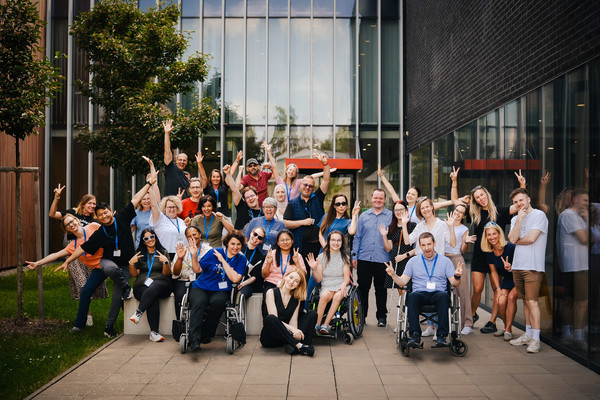During the first week of June, Palacký University Olomouc hosted the 10th anniversary edition of the Erasmus+ International Staff Week, organized by the Division for International Cooperation.
Out of more than a hundred applicants, 23 participants from 17 partner institutions across 14 countries were selected. Attendees came from countries such as Canada, Bhutan, the Dominican Republic, Georgia, Cape Verde, Morocco, Albania, Bosnia and Herzegovina, Germany, Finland, Belgium, Spain, Poland, and Austria.
Although this five-day event, combining professional and social programming, has been held at UP for ten years, this year marked the first time it was dedicated to the theme of inclusion, diversity, and equal opportunities. In line with this focus, the Faculty of Physical Culture, the Support Centre for Students with Special Needs, the APA Centre, and the Fair University initiative joined as co-organizers, sharing their examples of good practice.
Before the in-person meeting in Olomouc, participants attended an online session to introduce them to Palacký University, the city of Olomouc, and the Czech Republic. This also served as an introduction to the week’s central theme. A key highlight of the program was the workshop Inclusion and Diversity Across Sociocultural Practices (Diversity: A Hundred Different Ways), led by Mgr. Dita Jahodová (Czech Technical University) and Mgr. Klára Čmolíková Cozlová, Dis. (Academy of Fine Arts in Prague). The workshop focused on how personal characteristics and environments affect interpersonal relationships in academia – among teachers, students, and staff – and participants shared insights and examples of effective diversity support from various cultural contexts.
The physical program began with a welcome session, where the Division for International Cooperation UP was introduced in more detail, and participants engaged in interactive activities to get to know each other. This was followed by a guided tour of Olomouc, organized by the Welcome Office, which concluded with the workshop In Someone Else’s Shoes, focused on empathy and understanding as tools to reduce aggression and improve cooperation. The workshop was led by Mgr. Lucie Tesařová and Mgr. et Mgr. Hana Galiová from Jan Evangelista Purkyně University in Ústí nad Labem.
In the following days, the Support Centre for Students with Special Needs and the APA Centre organized a variety of experiential activities, allowing participants to better understand the everyday experiences of people with different types of disabilities. At the AC Baluo facility, attendees tried out wheelchair sports, handbiking, tandem cycling, blindfolded walking, guiding visually impaired individuals, and using special assistive tools. They also participated in "trust games" on a rope. A particularly moving experience was joining swimming and climbing sessions for children with autism spectrum disorders.
The expert program continued with a series of lectures. During the session Inclusion at UP, the Fair University initiative, Mobility Office, and Welcome Office presented university activities aimed at supporting the international community. Mentioned initiatives included Inkluden, focused on gender equality, work-life balance, and related topics. The Support Centre for Students with Special Needs shared specific experiences from its practice, complemented by two students who use its services, sharing their personal stories from studying and taking part in mobility programs abroad.
Given the professional background of most attendees, they were also invited to present their own projects and initiatives. Highlights included the GESTU project from TU Wien supporting students with hearing impairments, the Peer-to-Peer program at the University of Konstanz, and the Wroclaw University of Health and Sport Sciences' experience with three editions of the In Someone’s Shoes program.
Despite the many inspiring examples of good practice, the discussions also surfaced challenges that universities face in promoting inclusion. Together, we reflected on possible solutions, especially in the context of internationalization – such as a lack of activities for international communities, limited interaction between international and domestic students, insufficient psychological support, or complicated conditions for mobility of parents with young children.
To end the week on a hopeful note, we asked each participant to share one wish for change at their home institution:
"After these five days – if you could wish for one change at your university in the area of inclusion, what would it be?" Their answers included: stronger support for students with special needs, the establishment of dedicated offices for inclusion and diversity, staff training, adapted infrastructure and tools for students and staff, a shift in focus toward what is possible rather than what isn’t, and improved support for well-being and mental health.
We sincerely hope that our new friends will gradually see their wishes come true, and that this week—filled with inspiration, emotion, and understanding—will be just the beginning of our shared journey toward achieving equal opportunities for all, regardless of cultural, religious, social, or economic background, or any specific needs of our students and staff.

![[Translate to en:] [Translate to en:]](/fileadmin/_processed_/2/3/csm_IMG-20250603-WA0084_e3c3cd38fd.jpg)
![[Translate to en:] [Translate to en:]](/fileadmin/_processed_/1/a/csm_20250605_152936_864c5a8609.jpg)
![[Translate to en:] [Translate to en:]](/fileadmin/_processed_/f/4/csm_iro___apa_25_005_ee26d454f9.jpg)
![[Translate to en:] [Translate to en:]](/fileadmin/_processed_/c/1/csm_20250604_111758_e7a24d0ad3.jpg)
![[Translate to en:] [Translate to en:]](/fileadmin/_processed_/a/a/csm_20250605_154648_0f9d99d6ec.jpg)
![[Translate to en:] [Translate to en:]](/fileadmin/_processed_/5/a/csm_20250604_135322_8d729cbf52.jpg)
![[Translate to en:] [Translate to en:]](/fileadmin/_processed_/8/5/csm_20250604_110550_7ffbe6f44f.jpg)
![[Translate to en:] [Translate to en:]](/fileadmin/_processed_/9/b/csm_20250603_092844_30f6e4d09c.jpg)
![[Translate to en:] [Translate to en:]](/fileadmin/_processed_/8/4/csm_20250606_091933_95518515f3.jpg)
![[Translate to en:] [Translate to en:]](/fileadmin/_processed_/4/8/csm_IMG-20250603-WA0032_a53e24cde4.jpg)
![[Translate to en:] [Translate to en:]](/fileadmin/_processed_/d/a/csm_IMG-20250605-WA0036_e3bce93eb9.jpg)
![[Translate to en:] [Translate to en:]](/fileadmin/_processed_/4/2/csm_IMG-20250605-WA0034_5d45c5d730.jpg)
![[Translate to en:] [Translate to en:]](/fileadmin/_processed_/9/0/csm_iro___apa_25_011_0eed981f1f.jpg)
![[Translate to en:] [Translate to en:]](/fileadmin/_processed_/0/d/csm_IMG-20250604-WA0011_d6a1051c1f.jpg)
![[Translate to en:] [Translate to en:]](/fileadmin/_processed_/a/7/csm_IMG-20250606-WA0015_0fc28edf32.jpg)